Original Article: https://www.dogster.com/dog-breeds/alaskan-malamute-vs-husky
Click to Skip Ahead
The Alaskan Malamute and the Husky sure do have a lot of similarities, from their robust winter coats to their friendly, cheerful appearances. These dogs share a very similar purpose, and sometimes, it’s very hard to tell them apart.
In this article, we’re going to explore these almost-twins so you can see how they differ. One might just be a better fit for you than the other, so let’s get the details.


Visual Differences
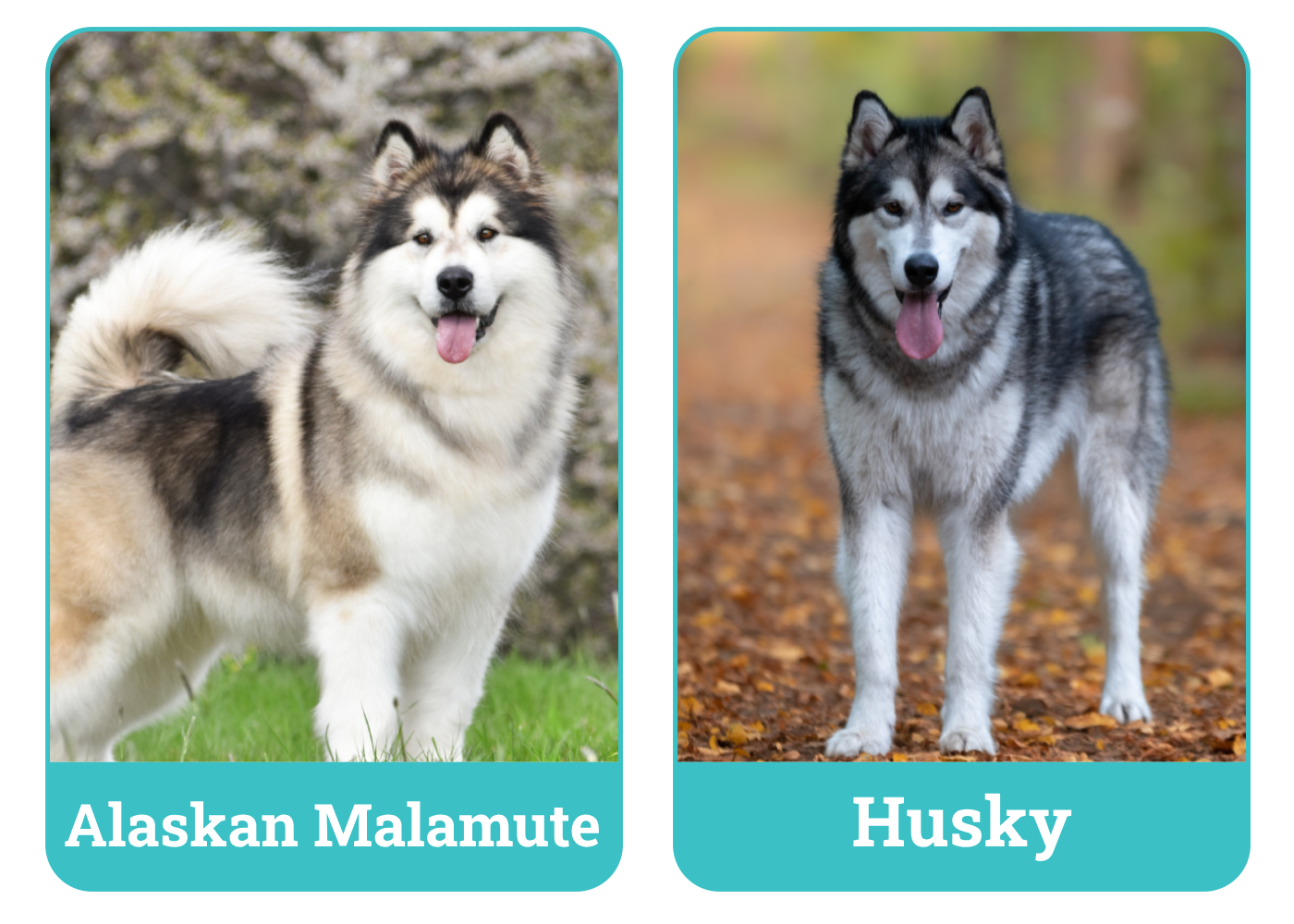
At a Glance
- Average height (adult): 24–28 inches
- Average weight (adult): 70–130 pounds
- Lifespan: 10–12 years
- Exercise: 2+ hours a day
- Grooming needs: High
- Family-friendly: Sometimes
- Other pet-friendly: Sometimes
- Trainability: Intelligent, stubborn
- Average height (adult): 21–23 inches
- Average weight (adult): 50–60 pounds
- Lifespan: 10–15 years
- Exercise: 2+ hours a day
- Grooming needs: High
- Family-friendly: Yes
- Other pet-friendly: Often
- Trainability: Intelligent, loyal, mischievous


Alaskan Malamute Overview
The Malamute is a large, sturdy dog that is robust and muscular. Wider and broader than their Husky counterparts, these dogs certainly can toss their weight around! These dogs were bred to be beasts among them.
They are highly capable of learning how to pull a variety of objects, and they also can learn to do a laundry list of other things, making them highly useful for utility.
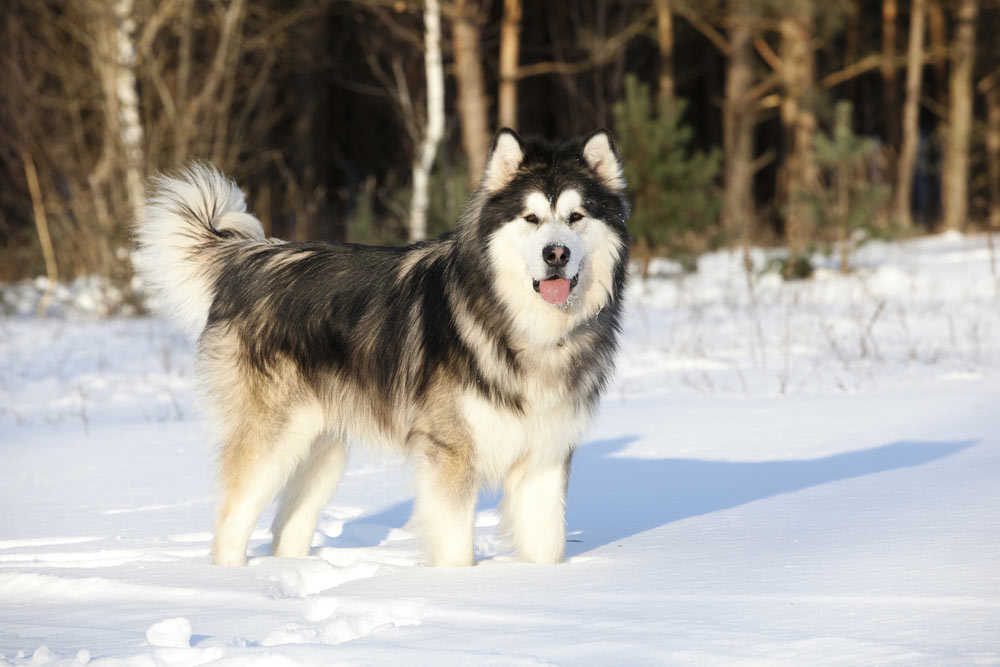
Personality / Character
The Alaskan Malamute is playful, excitable, and pack-minded. Once you get on this dog’s side, you are a friend for life. These dogs form exceptionally close bonds with their human counterparts. They much prefer life spent with other canines and their human friends, as they consider them family.
This is a trait that they share with Huskies, as both of these dogs have the pack mentality. But they can be stubborn and hard to handle. It is imperative that you are an experienced dog owner for a successful pairing.
If this is your first dog, it can be extremely challenging, which can impact your relationship. These dogs sometimes don’t play well with others, meaning that they might not get along with your current dog and might not accept a new dog in the future.
Exercise
Alaskan Malamutes certainly need their fair share of exercise. Thankfully, they are not quite as hyper or exercise intensive as their Husky counterparts. Malamutes tend to be a little bit more laid back and even keeled.
Still, an Alaskan Malamute will require roughly 2 hours of exercise per day to stay happy and healthy. Rather than fast-paced games and sprinting, the Alaskan Malamute much prefers long, fast-paced walks, hiking, and of course, playtime in the snow!
Training
Alaskan Malamutes were built for training! They are highly capable of learning. Since they were particularly bred for sledding purposes, it’s no wonder they are capable of picking up any task. Your Alaskan Malamute will be very task oriented, meaning they love to have a job to do. They don’t like sitting around with no commotion going on. So the more you can fill their time, the better.
These dogs are highly receptive to training, but they require a firm hand. Because of their high intelligence, they can be rigid and stubborn at times, meaning they might challenge you for the role of alpha.
It is important that you respectfully but efficiently show them that you’re the boss, even if that means enrolling in professional training to strengthen your relationship.
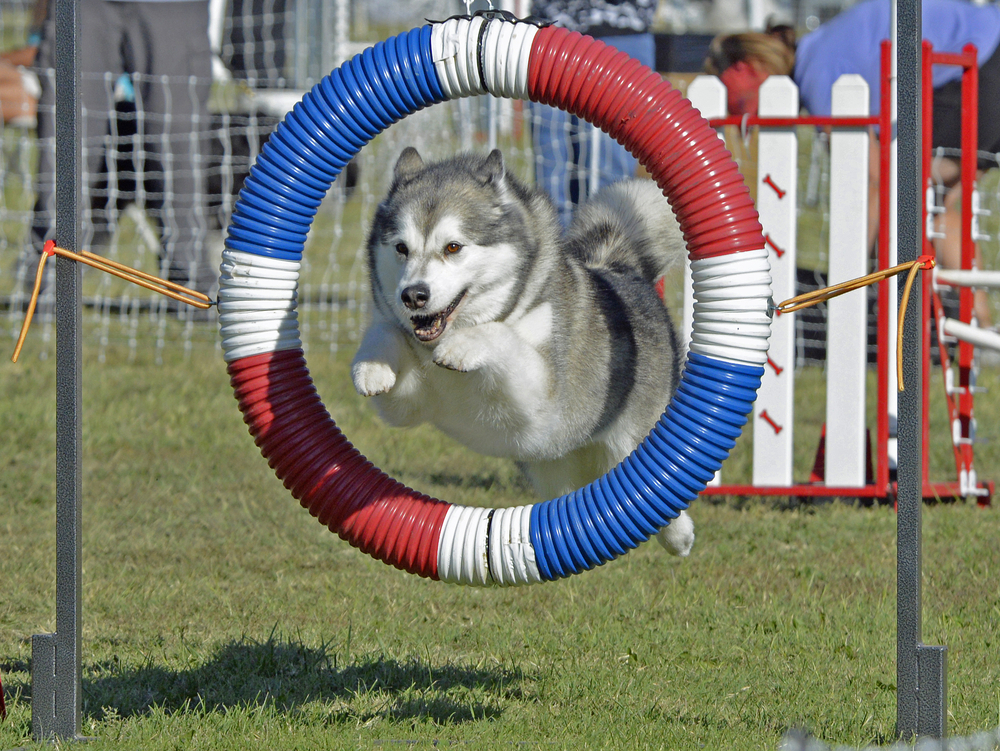
Health & Care
The Alaskan Malamute is a very sturdy, healthy dog designed with elements of their purpose. Few health issues develop at some point in their lifetime, as these dogs are typically extremely sturdy, hardy animals.
This heavy-duty dog can withstand harsh winters in less than favorable surroundings. They generally are in sound health, especially if you purchase them from a reputable breeder with extension of knowledge on the particular breed itself.
However, certain genetic health factors have been known to show up in the breed. It is important to understand what they are so you can navigate through potential challenges throughout their lifetime.
- Infection
- Obesity
- Hypothyroidism
- Hip dysplasia
Suitable For:
The Alaskan Malamute is best suited for experienced dog owners that are familiar with training a dog. You also need to be able to meet their exercise needs and play with them regularly. Because of their size, they aren’t ideal for apartments or small living spaces and prefer space to run around. But they will love having other pets in the home.


Husky Overview
Unlike the Alaskan Malamute, Huskies are spry and agile, capable of traveling long distances. Malamutes, on the other hand, are good for short bursts. Huskies are also more popular, so they’re a lot easier to come by. Husky breeders out there are a dime a dozen, so Huskies might be cheaper as well.
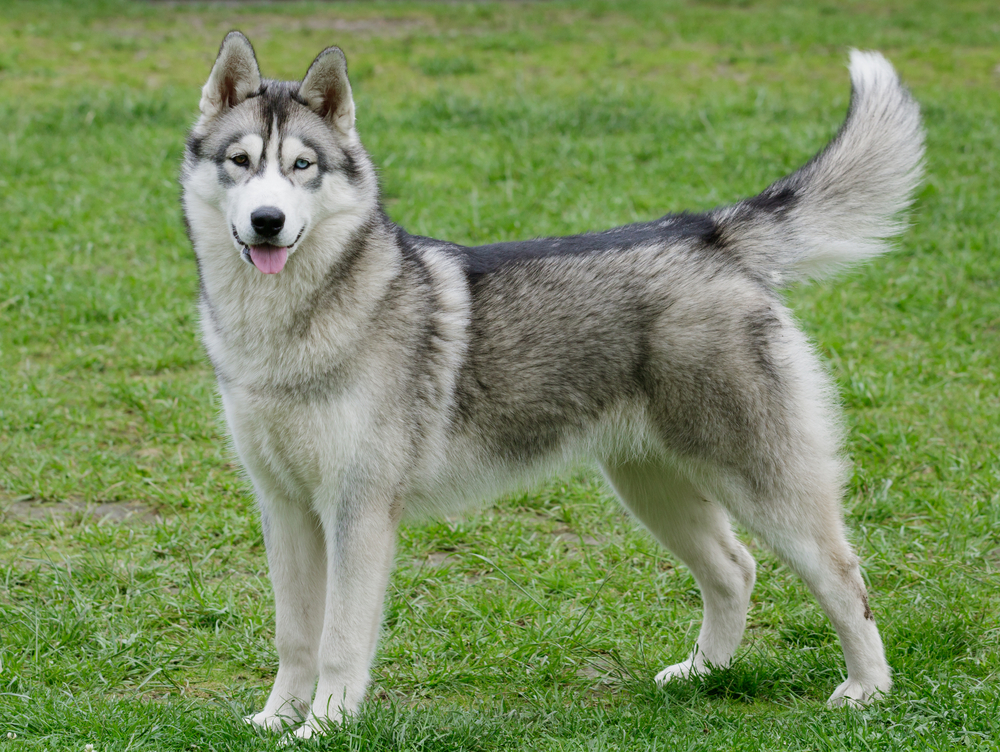
Personality / Character
You’ve probably seen Huskies littering up your Newsfeeds and For You Pages. These dogs are highly social, talkative, curious creatures that will fill your days with laughter. Unlike the aloofness of the Alaskan Malamute, the Husky wants to socialize!
They will make friends easily and very rarely are they aggressive, nasty, or territorial. These dogs are heroes on the scene, constantly looking for someone to help. These interesting animals are favorites for a reason.
These dogs can acclimate into a variety of lifestyles and their high energy can be super fun for active folks.
Exercise
Just like the Malamute, your Husky is going to need lots of exercise to keep them fit, and healthy. You definitely cannot negotiate with this, so they often don’t make suitable candidates for people with mobility issues of any kind.
Huskies require stimulation both mentally and physically. That means you’re going to need to keep their brain busy daily. These dogs are not good candidates for being left alone because they get bored very easily and can be majorly destructive as a consequence.
Training
Like their Alaskan Malamute counterparts, Huskies require a very firm hand during training. While these dogs are chipper and social, they can get off task easily and might even challenge you for the role of the boss.
It is important that they understand their role very early, so they can fall in line accordingly. Since they are pack animals, they take their role very seriously, meaning that you won’t have to do much convincing once you assert your dominance.
However, since these pack animals absolutely thrive on the approval of their owners, it can be a little bit easier to train them than their Alaskan Malamute counterparts. That is because they will genuinely care what you think, even if they have trouble with impulse control at first.
The Alaskan Malamute is a little bit more stern and stubborn in nature, making professional training highly advisable. While training the Husky can also be terrific in many scenarios, it isn’t necessarily always a must.
If you’re an experienced canine owner, Huskies are very intelligent animals that can be relatively simple to teach.
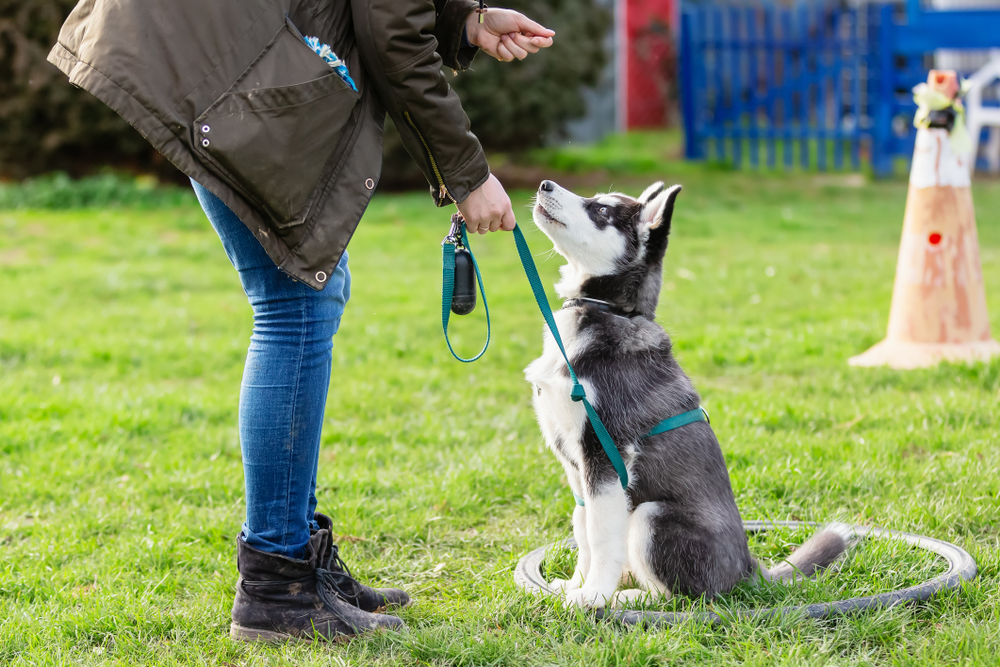
Health & Care
Like the Alaskan Malamute, Huskies are incredibly strong animals that are generally healthy. However, as with any animal, Huskies can develop a number of environmental or genetic health conditions.
A good way to avoid certain issues is to purchase from reputable breeders who have an extensive knowledge about breed health.
- Inflammatory bowel disease
- Skin infections
- Obesity
Suitable For:
Like the Malamute, a Husky is best suited for people that have plenty of time to spend exercising them and keeping them entertained. They also don’t do well in small living spaces and apartments, but this has more to do with their energy levels than their size. Huskies are also very vocal, so they need large living spaces and yards to play in. They also do best having another dog in the home to keep them entertained.


Nearly Identical: How to Decipher
The Alaskan Malamute and Husky are both so similar, it’s really hard to pick one. However, since everyone’s lifestyle is different, the key differences between the two of them might make the decision easier.
Huskies are simply more social by nature. They thrive on companionship from both other pets and human counterparts. They would prefer to be the center of attention in any case. The Alaskan Malamute, on the other hand, doesn’t mind falling by the wayside.
In fact, this is a dog who often needs time to recharge their batteries. So, they don’t mind living a slower-paced life and have no real qualms about being left alone. Huskies, on the other hand, might start developing behavioral tendencies that can be problematic.
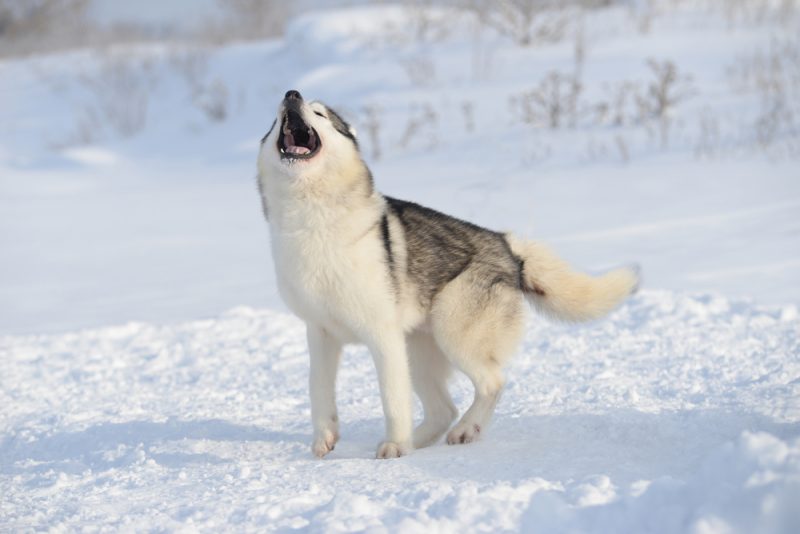
Huskies are very prone to separation anxiety, which can lead to attempting to escape enclosures, destroying items around the household, and being all-around more neurotic.
So, Huskies are best for people who can socialize them very well and provide them with adequate stimulation. Alaskan Malamutes are best for people who are a little more introverted in nature.
Both breeds are hard to groom, require a ton of exercise, and grow to be quite large. However, the Alaskan Malamute outweighs their Husky counterpart by a good 30 to 50 pounds. So keep in mind that the size difference might be a lot more than what you’re anticipating.


Which Breed Is Right for You?
Trying to decide between the Husky and Alaskan Malamute can be very difficult! After all, these two share so many similarities, how could you possibly decide? While they are very alike in both personality and overall appearance, there are some key differences that can help you with your decision.
If you are a more social person who is around a larger number of strangers or unfamiliar faces, having a Husky might be a more suitable match. If you’re more introverted and don’t have a lot of stimulation in your day-to-day life, an Alaskan Malamute might be better for you.
At the end of the day, the choice is yours!
Featured Image Credit: (L) Hanna Borysenko, Shutterstock, (R) Anciens Huang, Shutterstock
Source: Dogster












